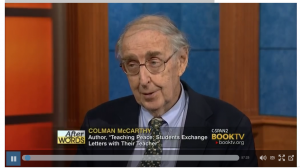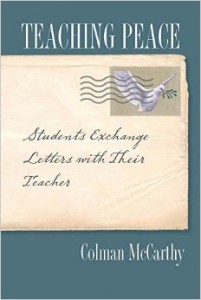In this week’s Education Corner, I’d like to share with you this interview with Colman McCarthy on C-SPAN2’s After Words program, which has given me great inspiration in my own teaching this month. As we approach the summer months, it’s a perfect time for us educators to reflect on our own teaching practice, and this interview provides much food for thought!
McCarthy is interviewed by Medea Benjamin, co-founder of the activist group CODEPINK, and it’s delightful to watch the candid and warm conversation between these two lifelong peace activists and friends. The interview highlights McCarthy’s latest book, Teaching Peace: Students Exchange Letters with Their Teacher.
McCarthy spent his career as a journalist at the Washington Post, and had the opportunity to interview many global peace leaders, from Mother Teresa to Desmond Tutu. He would always ask their opinion about how they would increase peace and decrease violence in the world. He said the answer he received most consistently could be summarized as “you need to go to where the people are.” This gave him the idea to approach a local high school about teaching a course on peace studies, which he has been doing in schools and universities since 1982. His book I’d Rather Teach Peace, is a memoir on his teaching career and is a favorite among many peace educators.
The interview gave me much food for thought, as an educator, peace worker, and human being. I’d like to share some of my takeaways here. I would encourage you to watch the interview yourself and share your takeaways in the comment section below!
He doesn’t give homework: He discusses how he feels homework is unnecessary, reminding us that Montessori and Socrates didn’t give homework, so why should we? As an adjunct faculty member who is not paid for time I work outside the classroom, grading homework essentially becomes volunteer work. While I don’t assign what I think to be unnecessary or busy work, I do have the students keep a journal throughout the semester, in addition to writing a paper. I love reading their journal entries, which allows me to see what they’re absorbing, struggling with, and integrating into their lives. At the same time, the journals become burdensome on my end and take me hours to read and write feedback – hours I am not compensated for. Hearing Colman say he doesn’t give homework has allowed me to rethink my journal assignments, and made me ponder how I can still elicit this information and reflection from students, but perhaps more in “real time” rather than in writing assignments that become a heavy load on my end.
“Grades are degrading,” he quips at one point. Likewise, I have a disdain for grades, as I feel it plays into the punishment/reward mentality that is the root of much violence and is part of the “old story” of humans as competitive (rather than collaborative, as the new story tells us). That said, I have to give grades because I work within the formal education system – a position for which I am very grateful. Along the lines of what he said about his findings from the world peace leaders, I’m meeting people where they are already. Teaching in the community college is a great privilege and allows me to work with people of all ages and backgrounds who might not otherwise come together in the same room. All this to say, I deeply appreciate the opportunity to be teaching peace in the formal education system!
He tells a story about one time on the first day of a college class, he told students that if they were there just to get an A, they could leave now and he would give one to them – trying to get students to consider that the class was about more than just the grade. Several students took him up on the offer, and he ended up getting in trouble with the administration and not being invited to teach there again. This gave me food for thought around my own relationship with grading. I’ve heard this story about him before, and part of me has always wanted to be so bold as to make this offer…but all of me wants to keep my job!
In my Nonviolence and Conflict Resolution class at San Diego City College, we read Nonviolent Communication by Marshall Rosenberg, and in Chapter 2, Rosenberg outlines how when we deny our own responsibility, it is a form of communication that blocks compassion. He gives the example of how a teacher might say “I have to give grades because it’s district policy” (see my words above!), but we can change our thinking to “I choose to give grades because I want to keep my job.” In this way, we acknowledge the choice we have in the matter, and we can choose to give grades from a more life-affirming place. So, I choose to give grades because I love my job and the opportunities it affords me to make peace education accessible to the wider community.
“If you don’t teach children peace, everyone else will teach them violence.” YES! He talks about how students come into these peace studies classes, and it’s the first time students have studied peace in their entire scholastic careers. This is something I have experienced in my own life, and something my students definitely experience as well. Part of why I went into the peace education field was because I stumbled upon learning for peace on my own in my adult life, and a) wanted – no, needed – to learn more, and b) was somewhat outraged that I had not learned about peace as part of my formal education at any point! My students have a similar experience, and in speaking with other peace studies professors, we find across the board that students are equally outraged that it took them – often stumbling accidentally – into a peace studies class to have access to this information that they think should be taught at all levels. The students that come through peace studies are the greatest advocates for it, and they would definitely tell you that we need to teach children- everyone – peace and nonviolence.
Discussion-based classes that deemphasize the syllabi: This made me feel validated about my own teaching practice and style. I create a syllabus, yes, but we rarely follow it exactly, and my students would often laugh as I shared the day’s “agenda,” knowing we’d rarely get through it (though I have the best intentions 🙂 and sometimes would end up on a completely different tangent, often responding to current events that happened over the weekend (but always related to peace and nonviolence! Most things are :). My own feeling on it is that there is nowhere to go – we are working for peace, learning for peace, and there is no endpoint or destination. We can’t possibly cover everything we’d need to or want to in the course of 16 weeks. We deal with what’s at hand, applying the theories to life, particularly things that come up in current events and in the students’ lives in their relationships and with their families.Hearing Colman speak about this, I felt validated in the way I approach teaching and learning. He says there’s no need to rush through Gandhi or Dorothy Day, and I wholeheartedly agree!
Self-study research paper: In the college classes in which McCarthy needs to give grades and assignments, he has the students write a research paper on their own life, exploring questions like Where do you spend your money? Where do you spend your own time? He also encourages them to stop drinking for the semester and write about that – a particular hard challenge for most college students. I loved this idea for a prompt and will definitely be mulling it over this summer to see how I might incorporate similar ideas.
Conscientious non-voter: McCarthy is a self-professed conscientious non-voter, something I had never thought about quite in this context. He doesn’t vote because war is embedded in our constitution as a form of conflict resolution, and anyone who is sworn into the position of Commander-in-Chief takes on this role is signing up to uphold the law. Therefore, he does not vote. Personally, I have always voted and gone to great lengths to vote, such as filling in an absentee ballot at a roadside truck stand at the end of a dirt road in Niger, West Africa, where I was a Peace Corps Volunteer during the 2004 elections. I have always felt that it was a responsibility and it was a way to make my voice heard (even though I also feel this is rarely the case with the current situation of out-of-control campaign financing). Hearing him say that he conscientiously abstains from voting for this reason is definitely causing me to reconsider my choices for our next national elections (local elections are a different story).
Question the answers: He tells his student not just to come into the class with questions, but to question the answers. What answers? The ones that we’ve been given that provide violence as a solution. In our culture, violence is taken as a given, a reasonable way to resolve conflicts. But why? These are the questions we ask in peace studies, and most especially looking at the root causes of violence and the alternatives to violence – and how we can build a world that we all want to live in.
Although I’m going to reconsider the amount of homework I give, as I close this post, I am giving myself some homework: to read the book! Stay tuned for my next education corner blog in which I will review Teaching Peace!
What do YOU think about grading, assignments, and about teaching peace in general? I’d love to hear your comments below! Feel free to also reach out to me at education@mettacenter.org. I’d love to hear from you!











One thing in this interview I cannot forget: The Washington Post telling Colman McCarthy that they didn’t want his peace articles anymore because they didn’t make the paper any money! Which says a LOT about why they’re always fine publishing stories of wars and violence.